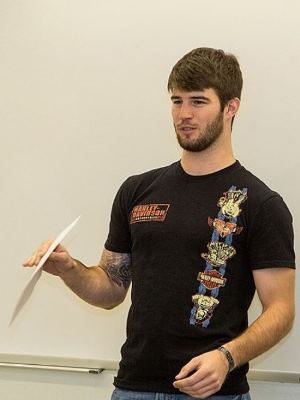Back from the front: Class helps veterans transition to college

This is Chase Vuchetich’s first semester at the University of Wisconsin-Stevens Point, and he believes he’s already taking the most important class of his college career.
“Back from the Front: Transitioning from the Military to Civilian Life” is helping him and 11 other veterans learn how to translate skills they developed in the military to skills they need to succeed in college – and life.
When you’ve faced life-or-death situations, what once seemed important fades to insignificance.
Vuchetich enjoyed playing football at Park Falls High School, from which he graduated in 2009. When the Green Bay Packers played in the Super Bowl in 2011, he remembers trying to get the score on his smart phone while he was at the U.S. Marine Corps Air Ground Combat Center in Twentynine Palms, Calif.
Then he spent seven months in Afghanistan.
Now, he says: “I couldn’t care less about professional athletes.
“They don’t put their lives on the line for anyone. They shouldn’t be anyone’s heroes,” Vuchetich said.
He knows something about heroes. He served with the Bravo Co. 1st Battalion 5th Marines from 2009 to 2013. Of the 50 Marines in his platoon, three were killed in action, and 28 were wounded. The men of 1/5 remain his closest friends.
He lived the simplicity and singularity of combat: the camaraderie of putting his Marine brothers above his own life, of being involved in something that mattered deeply, feeling the loneliness after military service comes to a screeching halt.
Veterans often have what those who fought in the Civil War called soldier’s heart – nostalgia for combat. “How can you miss something so horrible?” Vuchetich said. “After hundreds of years of war, the one thing that doesn’t change is the desire to go back.”
This is just one topic he and others talk – and write – about in class.
David Chrisinger, a UW-Stevens Point graduate who developed the class, leads students to cope by learning history, running and writing about their experiences. That is what veteran Brian Castner did. He wrote “The Long Walk,” which inspired this class, one of dozens first-year students can take at UW-Stevens Point to learn the skills they need to do well in college.
“Military veterans have always experienced challenges coming home from war. They’ve also always found ways to overcome those challenges,” Chrisinger said.
The military trains with “crawl, walk, run,” and Chrisinger follows the same step-by-step process. His students must attend four different kinds of campus events – an athletic event, for example -- and write reflections. They join clubs and examine what it’s like to be with civilians.
Students write about feelings, about what bothers them – such as assumptions about post-traumatic stress disorder plaguing all veterans, or perceptions that everyone in the military is like the troubled fictional character Rambo.
“Whatever’s wearing on me, I write about it,” Vuchetich said. “David’s the first one to tell me I can write and be published. He has a genuine interest in helping us succeed.”
“Chase is a great student and a fabulous writer. He has a real shot of doing some amazing things,” Chrisinger said.
Veterans have experiences and critical thinking skills most first-year students don’t have, Chrisinger said. They talk about using those skills, about resiliency and growth through trauma. “What made them good in the military can make them good in college,” he said.
“They are figuring out how to manage their past and grow. Becoming educated is their next mission. They want to be leaders. They want to do great things.”
The class, and Chrisinger, have been like therapy to Vuchetich. “This class makes me feel like I’m doing something important in life again.”
He also credited Ann Whipp, UW-Stevens Point’s veteran services coordinator, who helps with academic advising, financial aid and other support. “Ann has gone above and beyond my expectations.
“David and Ann, their whole goal is to set us up for success,” Vuchetich said.
